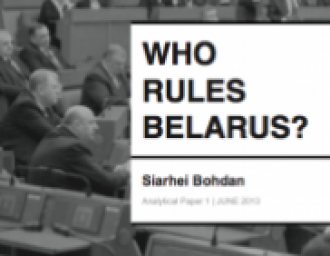Publication of the analytical paper by BelarusDigest and the Centre for Transition Studies

A sequence of reports offering in-depth analysis of various aspects of Belarus often overlooked by Western experts is launched. First in a series of such papers asks the question “Who Rules Belarus?”
The forthcoming papers will deal with personalities within the Belarusian regime, national identity of Belarusians, the system of education in Belarus, reforms of bureaucracy, business climate and other topics.
The first paper prepared by Siarhei Bohdan analyses the Belarusian political and economic establishment, its features and potential and prospects for change. While the government’s authority is concentrated in President Lukashenka, he needs sophisticated state structures to run the country and has retained his retinue for years. While Lukashenka as a politician has been analysed quite extensively, his close comrades have scarcely been studied.
The paper annex contains personal portraits of key figures in the Belarusian regime, including Lukashenka's older son Viktar, Prime Minister Mikhail Miasnikovich and Foreign Minister Uladzimir Makei.
Belarusian ruling elites emerged as a result of an effective power-sharing deal between Soviet-era bureaucrats and new supporters of the Belarusian president who have risen from the depths of the provinces to the very top due to their talent and unscrupulous ambitions.
This liaison has proven successful both in terms of its cohesion and performance. There has been just one failed mutiny, occurring in the late 1990s amongst the nomenclature, while the consolidated regime-linked elites have run Belarus rather successfully in terms of its governance and economy.
Politically, Belarusian ruling elites of whatever origin have opted for an original path of development which has contradicted Western ideas about democracy and human rights. However, the opportunistic opposition to the West is not based on any profound ideology. The ruling establishment in Belarus can act as responsible and reasonable partner for the West if offered a pragmatic deal.
While pragmatically working with ruling elites for the sake of preserving Belarusian independence and an eventual smooth transformation, the West should simultaneously demonstrate to demand the populace realistic prospects of cooperation with Europe.
You can download the whole policy paper here.
-
03.01
-
07.10
-
22.09
-
17.08
-
12.08
-
30.09








































